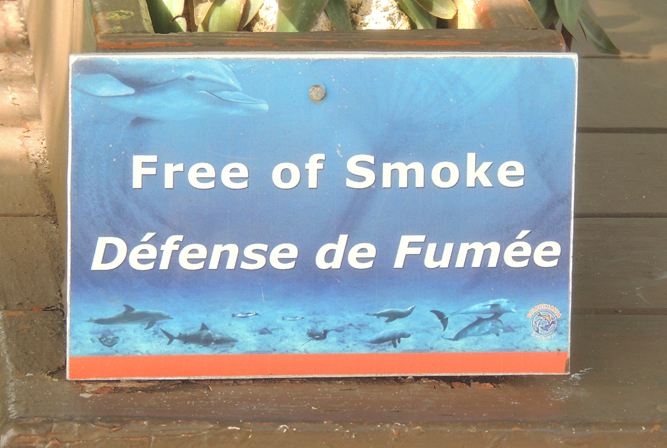Free of Smoke
« previous post | next post »
The following photograph was taken at Dolphin Discovery on the island of Tortola in the British Virgin Islands:
Bob Ackerman, who sent this to me, also provided these helpful notes:
This is an odd sign in more respects than one. This is on Tortola in the British Virgin Islands (or, as they prefer, just the Virgin Islands). The islands had a turbulent history in the 16th and 17th centuries, with the English, Spanish, French, Dutch and Danish all involved, both as sovereign nations and as pirates and freebooters of those and other nationalities. The English were well-established by 1672, so the English influence has lasted some three and half centuries. The French never had a strong or enduring position on Tortola. And yet, and yet, our sign is in French and English. Both, however, are wrong. "Free of smoke" is not English, and Google doesn’t turn that up even as an alternative, mistaken or idiomatic usage. It clearly means "No smoking." The French is closer to correct – close but no cigar. Unless maybe you go for the phonetics only. "Défense de fumer" is standard French as an admonition not to smoke. "Défense de fumée" would have the same pronunciation, but again neither on Google.ca (Canada, for Québécois) or on Google.fr does it show up as an alternative, mistaken or idiomatic usage. Except for the Algerian case. It means, sort of, "No smoked." Decidedly odd. Maybe one of the Mexican staff at Dolphin Discovery concocted this.
I did a little looking around for "Défense de fumée" and found these curious instances.
https://www.facebook.com/
http://www.ebay.fr/itm/

Margaret Dean said,
March 29, 2014 @ 8:08 pm
Well, strictly speaking, "free of smoke" is perfectly good English: it just doesn't mean what it's obviously intended to mean on the sign! (Although I daresay the people posting the sign do intend the locality to be free of smoke.)
John Lawler said,
March 29, 2014 @ 9:17 pm
Google search on "is a smoke-free zone" reports about 1.3 million hits.
This appears to be a common "NO SMOKING" sign text.
Dr. Decay said,
March 30, 2014 @ 3:15 am
I also immediately assumed that the author of the English phrase must be misremembering "Smoke-free zone". The French makes it more interesting. When writing quickly, and when they are pronounced alike, people (including me) sometimes accidently write the past participle when the infinitive is required. But in that case, someone like me would have simply written "fumé" – no reason for a feminine ending. The word "fumée" is also the noun meaning "smoke", which echoes the English formulation. Can we interpret it as a sort of bilingual eggcorn?
JQ said,
March 30, 2014 @ 8:44 am
Could "fumée" be interpreted as referring to a woman who has smoked recently? As in "free of smokers".
Stuart Brown said,
March 30, 2014 @ 6:02 pm
Fumée could only refer to a woman who has been smoked recently…
My impression is that confusion between homonyms like fumé, fumée and fumer (to which you could conceivably add fumez and (at a stretch) fumai, fumais, fumait and fumaient) is not uncommon today . If you look at the comments on some French blogs you’ll see lots of examples of similar mis-spellings. In a sense “défense de fumée” is not that bad, if you take “fumée to be the noun, because, even though it is ungrammatical (défense de must be followed by an infinitive in standard French), “Smoke Forbidden” at least implies you mustn’t smoke, whereas “défense de fumé” means nothing. People are always complaining about the idiosyncracies of English spelling, but French presents plenty of problems for the unwary too.
JJM said,
March 31, 2014 @ 8:59 am
I found "défense de fumée" quite interesting for a couple of reasons.
The correct spelling is "défense de fumer" of course but it's not uncommon among many French speakers to confuse homophone -er verb endings when they write (just as we mix up "you're" and "your"). In my own experience, I've frequently encountered things like "j'ai parler" for "j'ai parlé".
Here though, the feminine-form "fumée" seems quite odd; I might have expected "fumé".
I suspect someone armed with a pocket English-French dictionary has simply grafted the French noun for "smoke" to the standard rejoinder "défense de (infinitif)", not realizing smoke in French has separate written forms as a (feminine) noun and an infinitive verb.
A less certain hypothesis is that "défense" – being feminine – subconsciously influenced the typo "fumé" making it "agree" in gender.
Martin said,
March 31, 2014 @ 9:53 am
Is it possible to read the Frenchs sign differently, if one really wants to? A "défense de fumée" could actually be the prohibition of something unspecified, i.e. a "smoke prohibition." For example, it could be a "défense de fumée de stationner", that is a "smoke prohibition to park (a car)." What such a "smoke interdiction" would actually be is another question, though.
chris said,
April 1, 2014 @ 6:20 am
My initial reaction was to say that of course the dolphins are free of smoke, they're underwater; but since they have to surface and breathe air, maybe dolphins actually could be affected by secondary smoke. (And of course the other human patrons definitely could.)
AlexB said,
April 2, 2014 @ 7:23 am
Fumée is the normal word for smoke as a noun, as in détecteur de fumée (smoke detector). So the sign would mean that you're not allowed to produce smoke by whatever means.
More probably, it is just a confusion between 'fumer' to smoke and 'la fumée' the smoke. As has been pointed out, this confusion between homophones occurs often, even among native speakers.